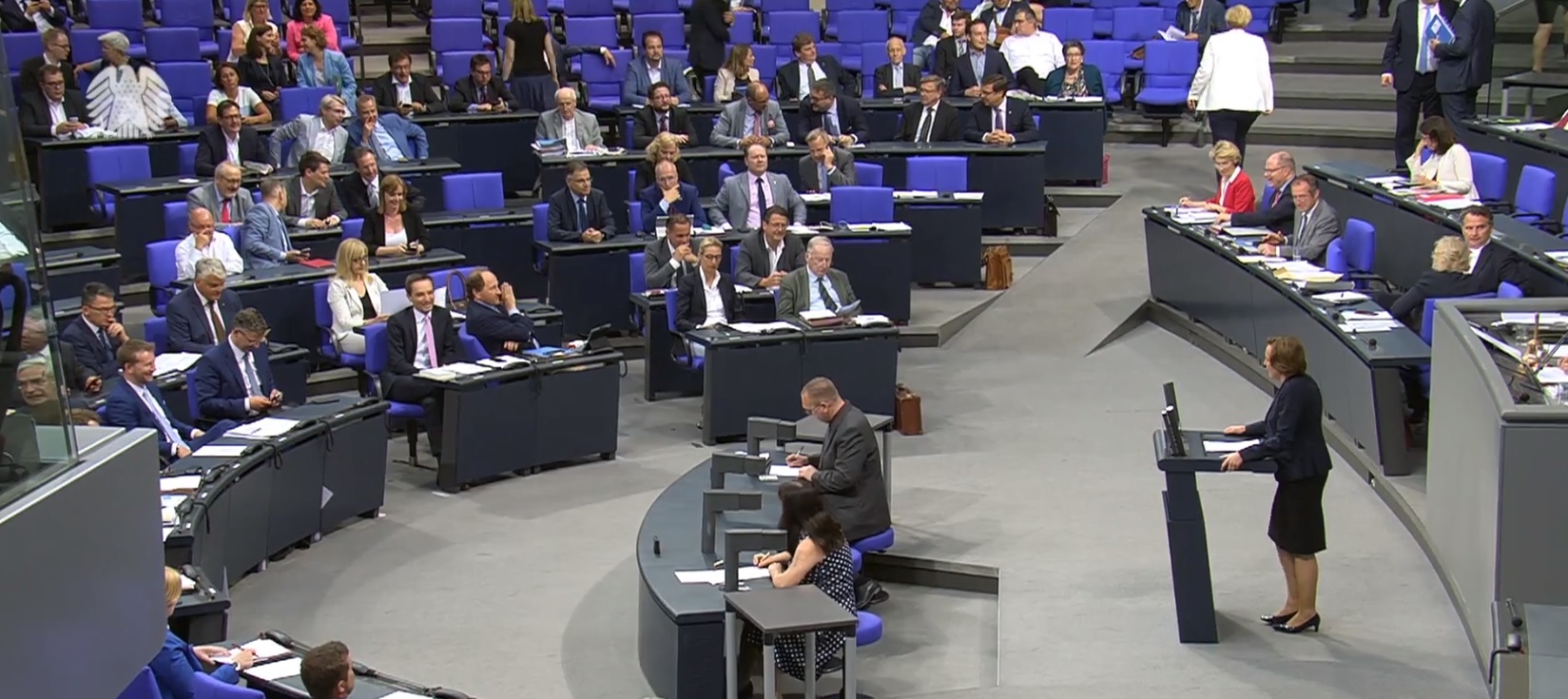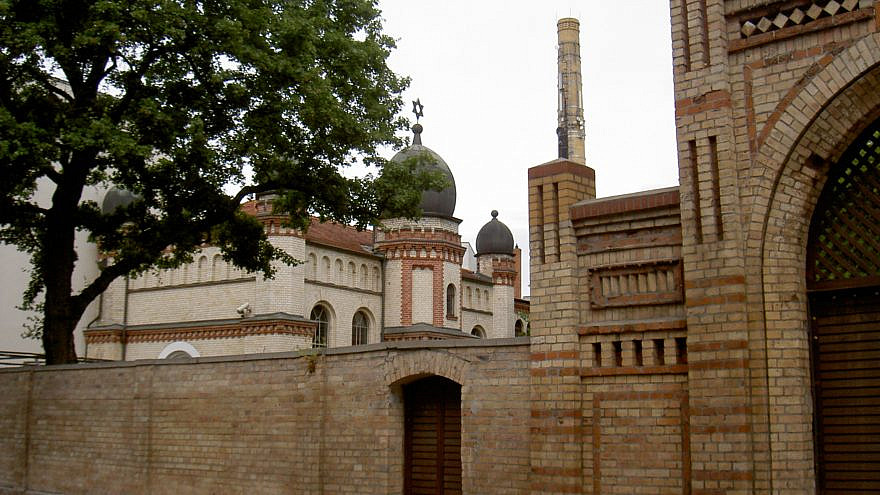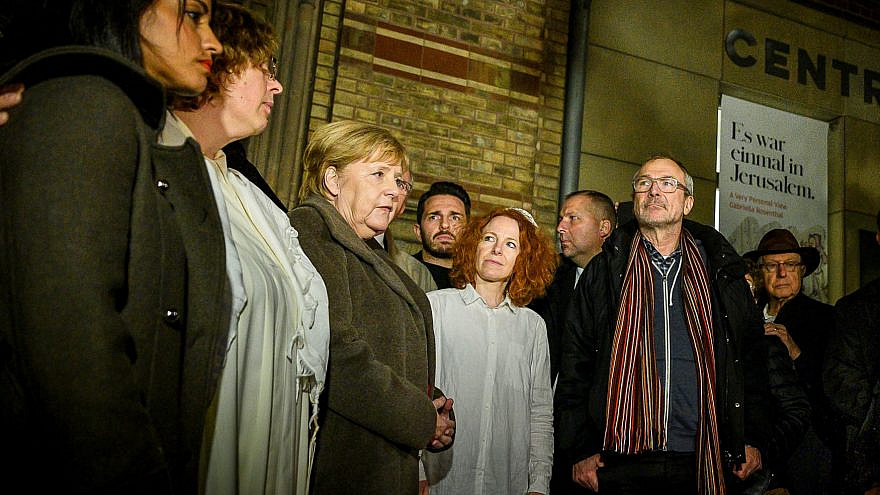“The background is still unclear.”
That was the refrain that German broadcasters repeated throughout Yom Kippur on Oct. 9 as news of the attempted attack on the Halle synagogue that killed two bystanders came to light. The options were obvious: either extremist Muslims or extremist right-wingers.
German media treaded lightly until the perpetrator was confirmed: a neo-Nazi, with suspect Stephan Balliet, 27, going so far as to brazenly document his attack and its planning. The style and rhetoric were similar to the shootings at the Tree of Life*Or L’Simcha Synagogue in Pittsburgh and Chabad of Poway in Southern California in the United States, which raised the alarm to the growing prominence of right-wing hate groups in America.
Outgoing Chancellor Angela Merkel of the Christian Democrats (CDU), who lost political ground to the right since her decision to welcome more than a million Muslim refugees and migrants since 2015, made a generic, televised statement: “We must use all the means of the rule of law to combat hatred, violence and enemies of mankind. There can be no tolerance whatsoever.”
The rise of the violent right
At a press conference the next day, Interior Minister Horst Seehofer claimed, remorsefully, that the “anti-Semitic threat from the extremist right and right-wing terror is very high in Germany.”
The German Jewish community criticized the country’s negligent security and surveillance systems. The synagogue was not given police protection during the holiday; it was the heavy, bolted door that kept the gunman out and protected the 80 or so worshippers inside.
Erstes 1, Germany’s largest public broadcaster, dedicated coverage to right-wing extremism, highlighting its social media hang-outs and recent history of attacks against Jews and foreigners alike.
Some analysts and activists, however, question German political sincerity when reactions seem to differ depending on the anti-Semitic source.
“Obviously, the terrorist was a native German, and this made it very easy for politicians to condemn the attack as right-wing and anti-Semitic, and to make nice, moving comments about solidarity with the Jewish community,” said Andreas Boldt, a German pro-Israel activist who founded the 38,000 member-strong “German-Israel Friendship” Facebook page, which saw a spike in likes since the attack. “However, for me, these are empty words. A lie. A bluff. Very dishonest behavior. Why? Germany regularly condemns Israel along with Islamic dictatorships in the United Nations.”
“The time of abstract confessions against anti-Semitism is over.”
Germany came under fire from the Jewish community and Israeli politicians when it voted down a motion in the Bundestag to change anti-Israel voting patterns in the United Nations. It has also been widely criticized by Jewish leaders, as well as the Trump administration for refusing to outlaw the political arm of Hezbollah that claims more than 1,000 operatives in Germany.
“The alleged neo-Nazi suspect arrested on Tuesday shared a global anti-Semitic worldview of a ‘Zionist Occupied Government’ theory,” stated Benjamin Weinthal, fellow for the Foundation for Defense of Democracies and an analyst of German politics. “The interconnections of modern anti-Semitism among Islamists, the far-left and the far-right are patently obvious, and Merkel offers no program of action to blunt the rise of this highly dangerous form of Jew-hatred.
“What can be done? Merkel can, with the swipe of a pen before next week, ban Hezbollah and the Palestinian terrorist entity Popular Front for the Liberation for Palestine in Germany.”
Weinthal regularly highlights the German political disconnect between anti-Semitism and anti-Zionism, most recently illustrated with Merkel’s downplaying Iran’s call to wipe Israel off the map as “anti-Israel” rhetoric as opposed to blatant anti-Semitism.
The Merkel government vs. the AfD
Anti-Semitism is often utilized by German political groups to make jabs at each other, particularly between the governing coalition and its arch-enemy in the domestic political sphere: the right-wing Alternative for Germany (AfD), which made significant gains in regional elections in former East Germany, where the Halle attack occurred, easing a connection between AfD and the attack.
SPD parliament member, Karl Lauterbach, as just one example, tweeted: “It’s the hate spread by the AfD that gave the far right a voice. This hate speech legitimized individual perpetrators to commit such acts of cruelty. These criminals want to do the AfD’s bidding. The AfD carries a large share of the blame for this attack.”

The AfD quickly tried to deflect such accusations, with party leaders condemning the attack with its own political twist: “Jewish life belongs to Germany. We must defend it against the attacks of neo-Nazis, left-wing extremists and Islamists!” declared party leader Beatrix von Storch in a statement.
Von Storch was a mastermind behind a motion in the Bundestag to ban Hezbollah that was rejected in large part because of the messenger, which was accused of instrumentalizing Jews to bash Muslims.
Vice president of the Jews in the AfD faction, Artur Abramovych, conceded that had the attack been motivated by Islam, the AfD would have likewise used it to castigate Merkel’s seeming Islamic appeasement. A popular AfD refrain is: “Islam does not belong to Germany.”
“But at least the AfD isn’t ignoring the far-right anti-Semitism,” he said. “There were many statements today and already yesterday, while the mainstream is trying to ignore the Islamist and leftist anti-Semitism.”
As case in point: Merkel issued no statement after an attempted knife attack by a Syrian refugee at the central New Synagogue in Berlin days before Yom Kippur. The perpetrator was let go by authorities the next day, much to the anger of Boldt and other pro-Jewish activists.

“When a Muslim attacks a synagogue, they will release him a few days after as if nothing happened, and nobody comes out in solidarity. They even try to understand him and try to explain why he did it,” said Boldt.
For example, a German court ruled that a 2014 firebombing of a Wuppertal synagogue by Palestinians was not anti-Semitic, but a protest against Israeli policies.
“It is incomprehensible how someone who tries to penetrate a synagogue with a knife can be free again after less than 24 hours, as was the case last weekend in Berlin,” acting director of AJC Berlin, Dr. Remko Leemhuis, said in a press release on the Halle attack, concluding: “The time of abstract confessions against anti-Semitism is over. Anyone who wants to do something against Jewish hatred must above all begin by relentlessly naming it from every direction and in every shade, and not always picking out the group of perpetrators that fits into their own political agenda.”


























